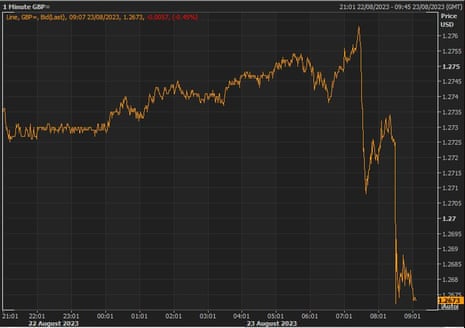Key events
Pound falls after UK business activity shrinks
The pound, which started to drop in the wake of the poor Eurozone PMI data, has taken another tumble after UK figures pointing to similar woes at home.
The pound is currently down around 0.5% versus the US dollar at $1.26.

Sterling is down nearly 0.27% against the euro at €1.17.
High interest rates – hiked in an effort to combat inflation – are partly to blame for the dismal business activity, and are “casting a shadow” over the UK economy.
John Glen, chief economist at CIPS, which produces the data alongside S&P, says:
High interest rates continue to cast a shadow over the UK economy, creating a lull in new orders, stunting output, and ensuring prospects for the private sector remain uncertain.
This reduction in activity has provided UK supply chains with much-needed respite after the instability of the last two years. High interest rates are starting to have their intended effect of dampening demand and reducing inflationary pressures, leading to moderated input costs and reduced raw material prices for manufacturers.
Businesses who had built up stock as a safety net against disruption have now reduced their inventories and created more balanced and efficient supply chains as a result.
The hope is that more predictable supply chains will help to stabilise the economy and support an eventual rebound in new orders. However, the question remains as to how long elevated borrowing costs will limit demand.
BREAKING: UK business activity shrinks, raising risks of recession
The UK has not escaped the gloom.
UK composite PMI unexpectedly fell to 47.9 in August, down from 50.8 a month earlier. It was a surprise contraction, given that analysts expected business activity to continue to expand, having forecast a reading of 50.3.
Services sector activity took a tumble, falling from 51.5 to 48.7 in August. A reading below 50 marks a contraction. Analysts expected a reading of 50.1.
That also accounted for a further drop in manufacturing activity, with the PMI reading coming in at 42.5 in August, compared to 45.3 in July. That was a sharper contraction than the 45.0 that analysts expected.
Chris Williamson, chief business economist at S&P Global Market Intelligence, said the a a renewed contraction of the UK economy looks “inevitable”:
The early PMI survey for August suggests that inflation should moderate further in the months ahead, but also indicates that the fight against inflation is carrying a heavy cost in terms of heightened recession risks.
A renewed contraction of the economy already looks inevitable, as an increasingly severe manufacturing downturn is accompanied by a further faltering of the service sector’s spring revival.
The survey is indicative of GDP declining by 0.2% over the third quarter so far.
A UK-India trade deal is likely to stay “tantalisingly out of reach”, one commentator warns.
Striking a deal would be a“game changer” for post-Brexit Britain, Susannah Streeter, head of money and markets at Hargreaves Lansdown, says.
But unless the Tory party to soften its hardline stance on immigration, businesses shouldn’t hold their breath on an agreement coming through anytime soon.
Streeter explains:
Hopes that the UK can give its very sluggish growth prospects a boost with a big trade win this autumn are fading after reports that a major deal with India remains elusive.
It appears that final negotiations have run into the long grass, with thorny issues such as visas for Indian workers still likely to be problematic.
India clearly has huge untapped potential for British firms super-keen to export but currently weighed down in the competitive stakes by high tariffs.
Unlocking the market could be a game changer, particularly for businesses who have seen previously robust exports to Europe twisted up in red tape. But with a hard stance on immigration, a red line the Conservative party is unwilling to rub out, firms are likely to need a lot more patience before there is a breakthrough.
Trade secretary Kemi Badenoch is visiting India for a meeting with G20 trade ministers this week, and although some piecemeal deals could be reached, the top prize still is likely to stay tantalisingly out of reach.
Private sector activity across Eurozone slides to lowest level since November 2020
Next up: Eurozone PMI
Private sector activity slid to its lowest level since November 2020, with the composite PMI falling to 47.0 in August from July’s 48.6.
That was lower than the 50-mark indicating contraction, and lower than analyst forecasts for a reading of 48.5.
Breaking the figures down further, the services sector shrank below the 50-mark for the first time this year, as consumers reined in spending. Services sector PMI for the region came in at 48.3, compared to 50.9 in July, and lower than predictions for a reading of 50.5.
Meanwhile, activity across the manufacturing sector, which has been on the decline since mid-2022, gave some signs of hope, with a reading of 43.7. That is higher than 42.7 in July, and is the first improvement in seven months. Analysts had been expecting a further drop to 42.6.
Germany suffers steepest drop in business activity since May 2020
The combined drop in German business activity takes the composite PMI reading to 44.7, from July’s 48.5.
Reuters is reporting that this is the steepest decline in business activity for more than three years, since May 2020.
Analysts had been expecting a reading of 48.3.
Meanwhile, the unexpected drop in Germany’s services sector activity is the first in eight months.
It suggests businesses remain pessimistic about the impact that rising interest rate and inflation are having on demand for goods and services.
France, Germany suffer further contraction in services and manufacturing: PMI data
A quick round up of private sector activity data out of Europe:
Germany’s services sector unexpectedly shrank, with the purchasing managers’ index (PMI) showing a reading of 47.3 in August. A reading below 50 indicates contraction,
That is compared to July, when the services sector expanded, with a reading of 52.3. Analysts had been expecting a reading of 51.5.
Germany’s manufacturing sector continued to contract, but at a slower pace, with PMI readings coming in at 39.1 for August, compared to 38.8 in July. However, that is better than the 38.7 predicted by analysts.

In France, manufacturing sector activity was less dismal than expected, with flash readings for August coming in at 46.4. While it indicates a contraction, it is better than the 45.1 reading in July and analyst forecasts for 45.
The French services sector contracted further, decreasing to 46.7 in August from 47.1 in July of 2023. Analysts had been expecting a milder contraction of 47.5.
Labour accuses government of "shambolic" delay to border checks
Labour has accused the government of creating “huge uncertainty” for businesses with “absolutely shambolic” post-Brexit border trade plans, PA Media reports.

It comes after reports that ministers are again planning to delay the introduction of border checks on animal and plant products coming from the EU, due to concerns that the extra bureaucracy could push up food prices and fuel further inflation.
Initial checks were due to come into force in October, with physical checks and other requirements to follow throughout 2024.
Shadow international trade minister Gareth Thomas has written to trade secretary Kemi Badenoch, demanding an update on plans and preparation costs:
The government’s handling of this important issue has been absolutely shambolic. They have delayed new border checks time and again, creating huge uncertainty for businesses, who are already struggling as a result of Conservative economic mismanagement.
With the deadlines for new checks just months away, it is unacceptable that businesses have not received a clear update from the government on whether the new border arrangements are even going to be introduced. The Tories’ trade barriers are stunting economic growth.
Labour will turn this around as part of our mission to secure the highest sustained growth in the G7.
The government said it was reflecting on feedback and “will publish the border target operating model shortly.”
Quick prints from European markets.
Gains on major indices are relatively muted, as trading kicks off:
FTSE 100 is up 0.15%
FTSE 250 is up 0.12%
Spain’s IBEX is up 0.1%
France’s CAC 40 is up 0.3%
Germany’s DAX is up 0.3%
The pan-European STOXX 600 is up 0.01%
Introduction: UK-India trade talks reportedly intensify as minister heads to Jaipur
Good morning, and welcome to our rolling coverage of business, the financial markets and the world economy.
We kick off with news that UK trade minister Kemi Badenoch is heading to India today, where she is expected to intensify talks over a post-Brexit trade deal with her local counterparts.
Badenoch is heading to Jaipur, where G20 trade and investment ministers will be gathering for talks on Thursday and Friday. But reports from the FT (£) and BBC suggest that the UK trade minister will use it as an opportunity to try iron out “some quite significant issues” to the trade deal, which – if its successful - would be a significant feather in Tory ministers’ caps post-Brexit
It is hoped that an agreement could slash costly tariffs on UK exports, including cars and whisky. Meanwhile, India is looking for a deal that would help improve access for its own manufactured goods and services, as well as work visas.
However, both news outlets suggest it’s unlikely that a deal will be struck before prime minister Rishi Sunak attends the G20 Summit on 9-10 September in New Delhi, where he is expected to hold talks with his counterpart Narendra Modi.
The UK Department for Business and Trade said in a statement:
The UK and India are committed to working towards the best deal possible for both sides. We’ve made good progress in closing chapters, and are now laser-focused on goods, services and investment.
While we cannot comment on ongoing negotiations, we are clear that we will only sign when we have a deal that is fair, balanced and ultimately in the best interests of the British people and the economy.
Otherwise, we’re expected a swathe of PMI readings from France, Germany, the Eurozone, UK and US, which will give us a sense of how the manufacturing and services industries fared in August.
However, analysts at Investec are not very optimistic:
We suspect that the direction of travel will still be in a downward direction, and importantly, that services are continuing to suffer from the malaise evident in the manufacturing sector
The agenda
8:15am BST: French flash services & manufacturing PMI (Aug)
8:30am BST: German flash services & manufacturing PMI (Aug)
9am BST: Eurozone flash services & manufacturing PMI (Aug)
9:30am BST: UK flash services & manufacturing PMI (Aug)
2:45pm BST: US flash services & manufacturing PMI (Aug)

.png)









